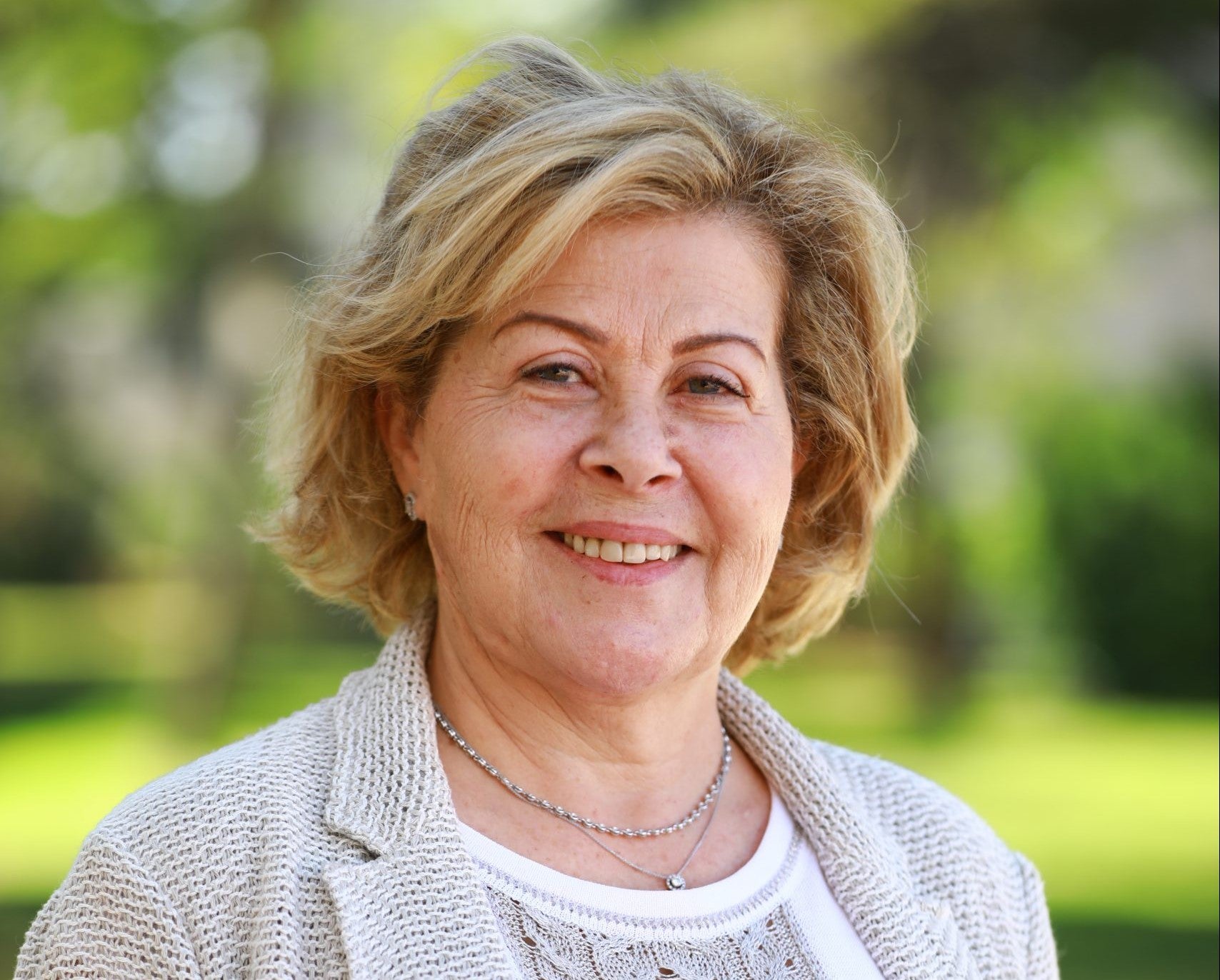Take Five: Building peace and solidarity between Libya and Lebanon
Date:
Nouhad Chebaro, 69, is among the 35 founding members of the Women’s Peacebuilding Network in Lebanon (WPNL) launched by UN Women with support from the Governments of Finland and Switzerland in January 2024. The network seeks to amplify its members’ contributions to inclusive and sustainable peacebuilding, and strengthen their leadership and participation through learning, exchange of expertise, networking and mutual support. She speaks to UN Women about her journey and efforts through the network.

What was your journey like, to becoming a peacebuilder?
I am from Aisha Bakkar, Beirut, and I studied sociology at St. Joseph University and physiotherapy in Milano. I started my career in humanitarian work when I was 20, just after the civil war began. I lived through the Lebanese civil war from 1975 to 1988, and I witnessed it all. I volunteered with the Lebanese Red Cross, something I am incredibly proud of, and later worked with the International Committee of the Red Cross. That’s where I learned about humanitarian work, which has shaped my entire life. It’s been almost 50 years of humanitarian work for me. This journey has brought many memorable moments. For example, during the Lebanese civil war, I managed to secure the release of five detained individuals by armed groups. I vividly remember these young men and how I safely returned them to their families. This story still touches me deeply. Helping others brings a wonderful feeling.
What roles do women peacebuilders play, specifically, in humanitarian action?
United Nations Security Council resolution 1325, which the WPNL fundamentally relies on, focuses on protecting women in conflict situations. We, as women peacebuilders, have a role to play to protect women from any form of violence – whether emotional or physical – and to ensure their right to live with dignity.
Peacebuilders like us have a role in resolving conflicts and facilitating peaceful coexistence. For example, we recently discussed the increasing tensions in collective shelters between displaced people, where psychological problems can escalate and lead to larger conflicts – including along sectarian lines, and strategies to de-escalate tension. Women peacebuilders’ role is also to build solidarity among people to help the country get through this difficult stage and move towards peaceful recovery and coexistence after the conflict ends.
How have you championed women’s roles in peacebuilding?
One of my biggest achievements is integrating women into political dialogue. I believe that for any political or policy work, having women’s involvement is essential. I’ve received several certificates and awards, all of which I cherish.
I currently live in Libya and for the past 13 years, I’ve worked with the Centre for Humanitarian Dialogue as a Senior Mediation and Inclusion Advisor. I’m also a member of the Women’s Peacebuilding Network in Lebanon. I’m grateful for the opportunity it has given me to connect with many incredible women who are working in peacebuilding – whether from a humanitarian angle or through integrating women into political and peace work.
What are you doing to support women’s humanitarian work in Lebanon?
My involvement with the WPNL through weekly meetings has really helped me emotionally and enabled me to do more. Thanks to this network, I feel like I’m present in Lebanon, even though I’m not physically there. The network has also expanded my connections. I met Sarah El Sherif, another woman peacebuilder who is currently leading the humanitarian response in Tripoli, Lebanon through her civil society organization Ruwwad El Tanmiyeh. Through the cash I fundraise from Libya, I support Sarah (and many other entities) in her efforts to provide a decent life to internally displaced persons (IDPs) in displacement centres. It fills my heart with joy to know I’ve managed to support another woman and a colleague in positively impacting the life of people in need. The more I see her work, and the photos of people smiling around her, the more motivated I feel to mobilize more resources for Sarah to advance with her relief plans. After all, this is the spirit of the network: to connect women peacebuilders and to create spaces for them to support and inspire each other.
What has changed about women’s humanitarian action in Lebanon since 1975?
Back in 1975, young women were working with the Lebanese Red Cross as humanitarian responders. There was a women’s movement at that time, though I can’t say it was as organized as it is today. Over time, women started realizing their role and place. The civil war made women recognize that they could contribute to rebuilding Lebanon, to peacebuilding and to stability in the country.
During 1975 war, although women didn’t have a place on the negotiations table, they were present on the ground. Later, the strong support from the United Nations in enacting resolutions, especially to protect women from violence during conflicts and the Women, Peace and Security agenda, made women more aware of their rights and capacities. Over the past 50 years, women have learned about politics, humanitarian work, and how to better organize in peace and conflict situations. They have also been acknowledged in their role as leaders, both internationally and locally, which has encouraged them to sustain their efforts.
Today, women are leaders on the ground, working to humanize aid. There’s something very beautiful about the solidarity among women. Just go out and see: women are the ones most engaged in the work on the ground because they care about stability. The voice of women has become much stronger. This shift encourages us all as women peacebuilders to work together with a single goal in mind: the well-being of Lebanon and the dignity of all its people.